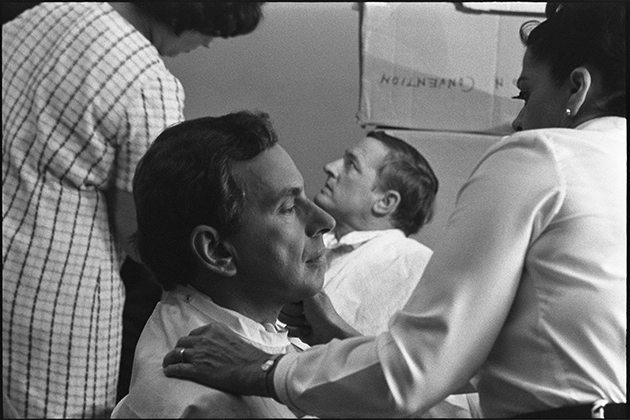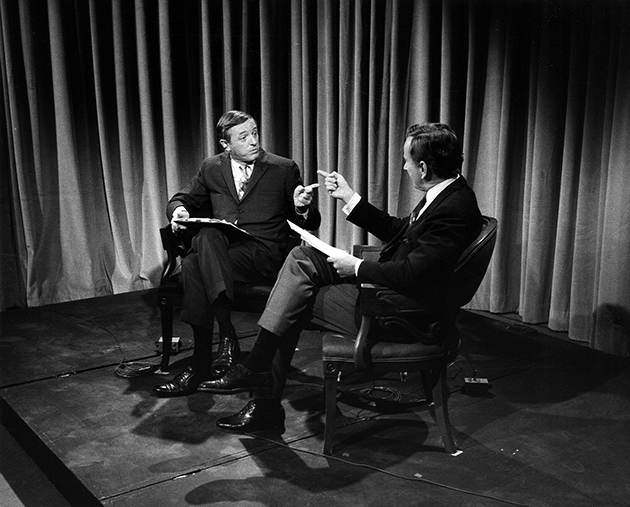Call Me a Crypto Nazi Again and Ill Sock Ya in the Goddam Face And Youll Stay Plastered
Best of Enemies co-director Robert Gordon confessed to me a while dorsum that his biggest fear was that "people won't go meet this film considering they think information technology's going to be deadening." Information technology isn't. The documentary—which premieres October iii at x p.m. on PBS (Independent Lens)—chronicles the ofttimes fiery debates between William F. Buckley Jr. and Gore Vidal that ABC aired during the 1968 election cycle in an endeavor to boost ratings. "It sounds similar a dry out documentary because people forget how witty these two guys are," Gordon told me.
"Quit calling me a crypto-Nazi or I'll sock yous in the goddamn face and you'll stay plastered."
Gordon and co-director Morgan Neville—whose Twenty Anxiety From Stardom won the 2014 Oscar for best documentary—skillfully weave archival footage together with interviews with the likes of Christopher Hitchens, Brooke Gladstone, Dick Cavett, and Buckley'south blood brother Neil. The movie climaxes during 1 of the duo's final debates at the Democratic National Convention in Chicago where, while discussing Vietnam State of war protesters, Vidal calls Buckley a "crypto-Nazi." The latter'southward response, which could even make Donald Trump blush, was perhaps the first viral sound bite in modern media history. "At present listen, you queer," Buckley retorted, twitching with anger. "Quit calling me a crypto-Nazi or I'll sock you in the goddamn confront and yous'll stay plastered."
Indeed, the televised verbal brawls between these 2 brilliant intellectuals anticipated the culture wars that would define, for decades to come, America's political struggles—and how the media would cover them. I sabbatum down with Gordon in San Francisco not long agone to chat about the de-evolution of our political discourse and the claiming of making a motion-picture show about conversations that took place decades agone.
Mother Jones: How did this project come up to pass?
Robert Gordon: In 2010, a friend of mine acquired a bootleg DVD of the debates and shared it with me, and I was like, "Oh my God, this is today's civilisation wars expressed by these two guys." As a documentarian, y'all are always looking for that cache of film you can apply to build a motion-picture show from; there was 2.five hours of raw contend. It seemed and so relevant to the partitioning in the country that I just idea, "Let's get on this immediately."
MJ: Had y'all worked with Morgan Neville before?
RG: This is our fifth film together. Between the fourth and fifth, he made 20 Feet From Stardom and got the University Accolade. I called him upward and said, "Manner to go Morgan! You're really putting the pressure level on us now." Only information technology'southward a big help having that laurels. People who don't know us are more willing to trust us; information technology'south the postage of legitimacy.
MJ: Was it challenging to get backers on board with such an unconventional documentary discipline?
RG: Yes, information technology took a while. Virtually said to us, "This is all very interesting, simply why exercise you run into information technology as relevant today?" And since the pic has been made, the response has been, "I can't believe how relevant to today this footage is."

Gore Vidal (front) and William F. Buckley get primped for their disharmonism. Independent Lens
MJ: Virtually of your past piece of work has involved music. What made you want to stray from that bailiwick?
RG: Most everything I've done has been about music, merely music as a style to talk about bigger social bug, bigger cultural moments or movements. I don't see it equally that large of a leap. The debates are the operatic vignettes that recur, and it's quite musical to me. The of import thing to me is that [my documentaries] are about changes in America, so is this.
MJ: It was quite a twelvemonth, 1968. How did you determine what historical and cultural context to include?
RG: There were cultural touchstones that have been investigated over and over and over, and we didn't want to redo those. And in that location are a lot of them to work with. I mean '68, like you said, it's rife with material, with cultural disagreement, violence, internationally—it'southward all there. Simply we wanted to focus on our guys and what they stood for and where those changes occurred [in relation to them].
MJ: But you did incorporate some major historical events into the film, similar the riots exterior of the DNC in Chicago.
RG: Yeah, totally, only only because it was there. Information technology felt similar the fighting on the street was being played out by these two guys in front of the glare of the national TV camera.
"I was surprised at the vigor with which Vidal pursued Buckley…Vidal seemed to thrive on animosity."
MJ: Was there anything that surprised you lot while researching these two men?
RG: I was surprised at the vigor with which Vidal pursued Buckley and his other enemies. Vidal seemed to thrive on antagonism and on feuding, and at the same time could exist very charming. You encounter him on Dick Cavett, and there'south a certain amuse to him, y'all like to lookout him, you similar to run into him talk, and I thought, "Well, surely this 'human being of ice' was a put-on." But then you read things like his obituary on Buckley, and, you know, he is a man of ice.
MJ: So did you feel similar you lot had to hold dorsum your own opinions about Vidal and Buckley?
RG: The film wasn't about our personal views and our personal politics. That would have undermined the flick'south potential. One of the interesting things I learned in the form of it was Buckley, whose politics I tend not to concur with, was potent plenty to publicly change his mind on the Iraq State of war. He had come up out very for it when it began, and over fourth dimension, when he learned more nearly it, he inverse. And that'due south a dauntless position for someone in his situation. I think it's very honorable and admirable.
MJ: In that location is that moment later on the famous blowup between Buckley and Vidal when you pan through all the interviewees in the documentary sitting in shocked silence. Then Dick Cavett goes, "The network nearly shat." Were those really these people'due south reactions?
RG: That's taking liberty in the editing room, is what information technology is. It was Cavett'south response that suggests that [those were their real responses], considering I asked Cavett about it and you run across him turn and think, and he has a long silence, and then he gives that very funny answer, and we thought, "Wow, what if nosotros extend that silence? Because that's kind of musical in a way." And we tested it and it was similar, "Ohhh, this is funny." And it never hurts to be funny.

The showdown Independent Lens
MJ: Yeah, the movie has a lot of funny moments; Vidal and Buckley are very entertaining to lookout.
RG: These guy were so smart, and they had a control of so many things: history, philosophy, economics, and, people forget, of humor as well. They were smart, witty guys.
MJ: I was struck by how intellectual their rhetoric was. It seems ironic that these debates helped inspire the trashy political debate nosotros now come across on cablevision.
These days, networks "have worked themselves upwards to the point where all they are is a series of Roman candle explosions."
RG: Yep, TV is pursued for the lowest mutual denominator. Networks, which had been civil to a fault up to that point in time, have worked themselves upwards to the indicate where all they are is a series of Roman candle explosions. The reason that the audition built for [Buckley and Vidal] is that, in addition to their cattiness, they were offering a lot of ideas and a lot of exchange, and they were humorous, as well. Information technology wasn't but that explosive moment that made this what it was. But Goggle box today seems to desire to have you come back from a commercial and go right into a fight turned up to 10, and three minutes later on become into a commercial—and that's success! People take been introducing the show in theaters as "delicious," and I recollect that suggests an appetite for more integrity on tv; more intellectual exchange, less vacuous shouting.
MJ: Yeah, I mean, it's hard to imagine someone citing Pericles on network Tv now!
RG: Yeah, I watched [the Vidal-Buckley debates] with a dictionary the first few times because I wanted to acquire the words, and they were maxim things I didn't know, and what did it hateful, and why were they choosing those words, and whom were they quoting? Wouldn't yous similar to watch a one-half an hour of political TV and and so take your notes and go look up what they were talking well-nigh? Yous glean what you need to glean, then afterward you lot can accept home more—it'southward a prize that comes in the box!
Source: https://www.motherjones.com/media/2016/10/exclusive-clip-best-enemies-documentary-gore-vidal-william-buckley/
0 Response to "Call Me a Crypto Nazi Again and Ill Sock Ya in the Goddam Face And Youll Stay Plastered"
Postar um comentário